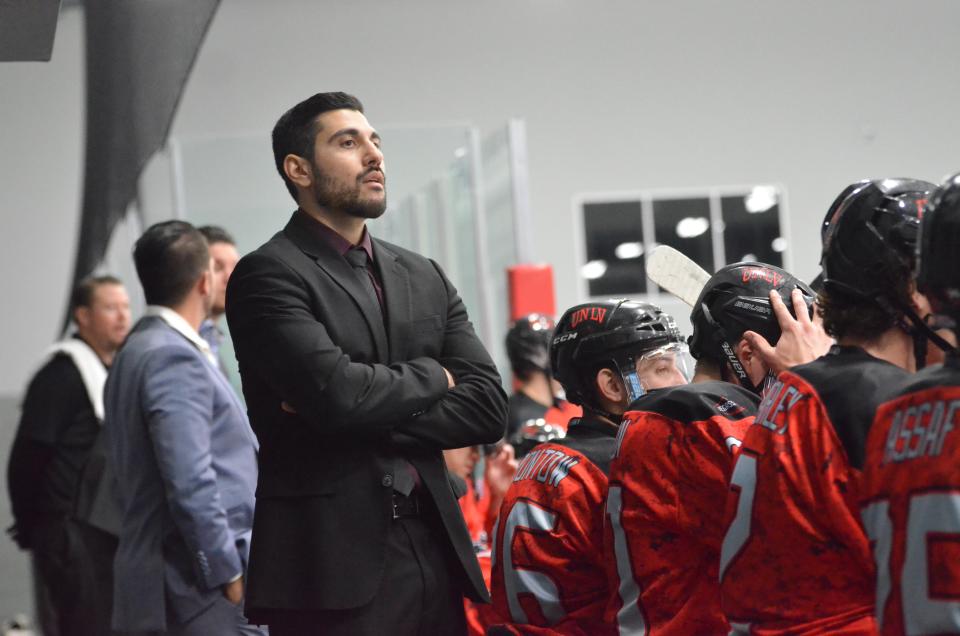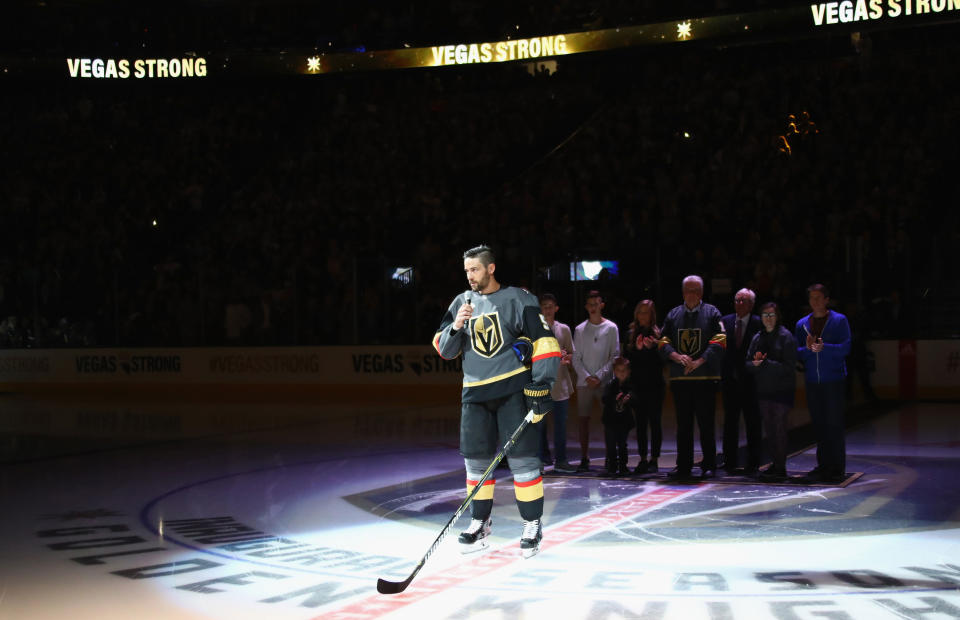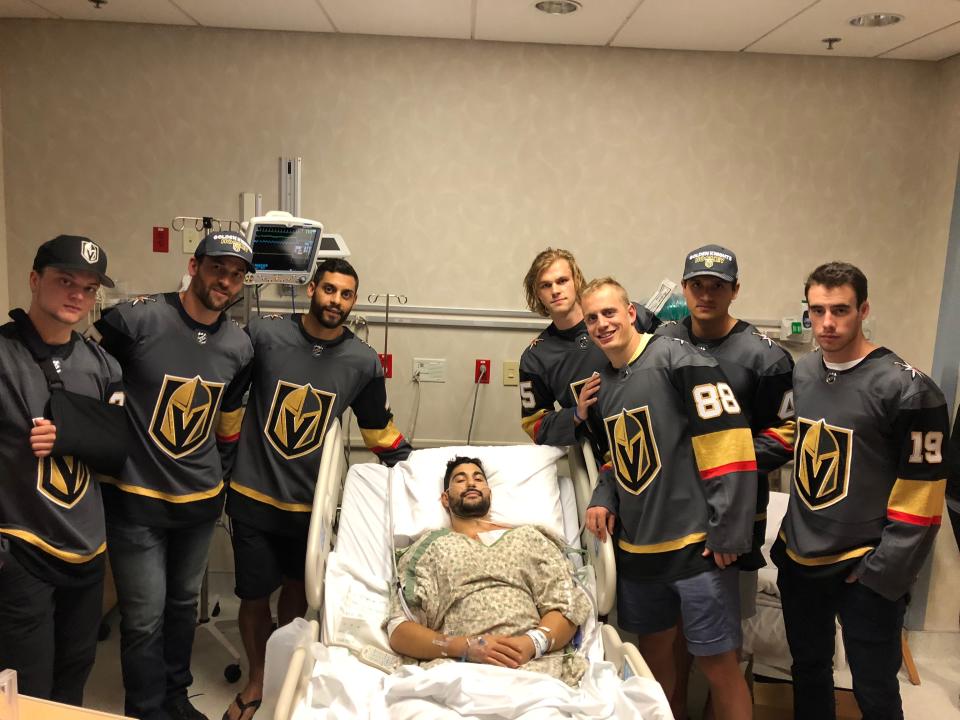Las Vegas shooting survivor Nick Robone knows exactly why the Golden Knights mean so much to the city
LAS VEGAS – Nick Robone understands the bond that exists between the residents of this gambling mecca that has been his home since birth and its new hockey team at a level few could comprehend.
Robone nearly lost his life on Oct. 1, a victim of the largest mass shooting in U.S. history, as he was enjoying a country music concert outside in the warm fall desert air.
As he fought for his life in the days after the attack that killed 58 people and wounded more than 800, Robone found the answer media have been searching for since the Vegas Golden Knights made their NHL debut in October.
Las Vegas quickly embraced the Golden Knights
For at least five months, reporters have descended upon Las Vegas in search of the answer to a seemingly unanswerable question: What exactly is behind the bond which exists between this city, where for years the only ice was in the free drinks handed out by scantily clad cocktail waitresses, and, as the team playfully likes to call itself, one of the NHL’s original 31 franchises?
Since the first exhibition game at T-Mobile Arena in late September, “The Fortress” has been rocking with loud and enthusiastic fans as Las Vegans quickly embraced the city’s first professional sporting team. Though Vegas finished only 17th in the 31-team NHL in average home attendance, at 18,042 a game in the regular season, it played to 103.9 percent of capacity, which was fourth in the league behind just Chicago, Minnesota and Washington.

Attendance figures alone, though, belie the extraordinary love affair the fans have with the team.
Robone survives the Route 91 shooting after being shot in the chest
Robone, the 28-year-old associate coach of the UNLV hockey team, didn’t make it to the memorable Oct. 10 home opener against the Arizona Coyotes.
That’s because he was hospitalized, recovering from wounds he suffered in the heinous attack on the Route 91 Harvest Festival country music concert. On that night, shooter Stephen Paddock killed 58 people and injured 851 others while spraying automatic gunfire into the concert grounds from his room on the 32nd floor of the Mandalay Bay Resort & Casino. Paddock later took his own life as police stormed his room.
Robone was enjoying the concert with his younger brother, Anthony, and friends. They were standing near the VIP tent directly across from Mandalay Bay, in easy sight of the shooter.
“I was in pretty much the worst possible spot,” Robone said.
A little after 10, Robone heard a brief sound, but didn’t immediately associate it with gunfire. Then, there was a longer, more sustained sound. After a brief silence, there again was a long, sustained sound.
“Just like everyone else, you don’t actually know what gunshots really sound like, and initially I thought it was firecrackers on The Strip because it wasn’t really consistent,” Robone told Yahoo Sports. “Then, there was more of a consistent barrage that kind of sounded like gunfire. It stopped and I looked around and didn’t see anyone injured yet. People were kind of crouching down and that’s when I crouched down, as well.
“I turned and faced Mandalay Bay and it kind of went off again, this barrage. And then, right away this second barrage came and I was probably one of the first ones shot. I felt it in my side, really.”
Robone was shot in the chest. The bullet traveled downward after entering his chest. Once inside his body, it turned right and barely missed his lung, settling in his latissimus dorsi, the large muscle group in the back.
Had it turned left, which it easily could have done, it would have hit his heart and the fatality total would have been 59.
Even when he was hit, though, Robone still wasn’t sure what had occurred.
“Even then, I didn’t know I had been shot,” Robone said. “I started spitting up blood out of my nose and mouth and I looked down and I had a hole in my chest. So that was when I said, ‘I’ve definitely been shot. This is gunfire and we need to leave now.’ ”
Robone’s brother, Anthony, is a firefighter for the Henderson Fire Department, a neighboring city southeast of Las Vegas. Robone draped his arms over the shoulders of his brother and of a friend, Billy Tufano, and they helped him walk to cover.
As they got to a place where they were out of the line of Paddock’s fire, Anthony saw a police car and got a first aid kit. He put a bandage onto his brother’s wound to try to prevent air from getting into his chest.
Ambulances began to arrive, but there were others in the vicinity in far worse shape, so Robone got into the second set of ambulances. The ambulance made the five-mile trip to Sunrise where, after a brief wait while more seriously wounded patients were attended to, a team led by thoracic surgeon Arnold Chung operated on him.
“It was chaos there, for sure,” Robone said. “I was put on a bed for a bit. There were a lot of people being seen. I was bad, but I wasn’t shot in the neck or the head or anything like that. So I sat there for like 15 minutes while they were going through taking care of the people in the worst trouble and then someone came and attended me. They were kind of triaging at that point. They wrote something on my forehead and took my vitals and all that.
“Not too long later, they came for me and said, ‘Hey, we have to get you into surgery.’ So they brought me into a room and I was trying to do my best not to move to try to make their job as easy as possible. They were really comforting and they handled everything like such professionals. The work they did for so many people, not just me, was incredible and it was because they were prepared for anything.”
Vegas Strong: Golden Knights respond to mass shooting
The Knights made their bones in this city not with their extraordinary play, but with their response to the shooting. The next day, defenseman Deryk Engelland and his wife brought food and drinks to a local fire station to help first responders who were overwhelmed by all they were dealing with.
Players fanned out to local blood donation centers, where lines to give blood to aid victims were as long as six hours long. They passed out bottles of water to those in line, posed for photos and signed autographs. They also trekked to local hospitals to greet and comfort victims.

On the night of the Oct. 10 home opener, the team gave a classy and measured response to the shooting in its pregame. Engelland, a Las Vegas resident since playing for the ECHL’s Las Vegas Wranglers in 2002, was given the task of addressing the crowd.
His words were perfect for the occasion.
“Like all of you, I’m proud to call Las Vegas home,” Engelland said that night. “I met my wife here. Our kids were born here. I know how special this city is. To all the brave first responders who have worked tirelessly and courageously through this whole tragedy, we thank you.
“To the families and friends of the victims, we’ll do everything we can to help you and our city heal.”
He paused, gulped for air and finished by saying, “We are Vegas Strong,” as the crowd roared.
That was the moment that really cemented the bond between the team and its city.
Las Vegas’ love affair with the Golden Knights
Practices at the new City National Arena in the shadow of the Red Rock Resort were filled with loud and enthusiastic fans as early as November. Roars go up routinely as each player hits the ice. On Sunday, the day before Game 1 of the Stanley Cup Final between the Knights and Washington Capitals, all the wristbands required to get into practice were gone more than 90 minutes before it was set to begin. Hundreds of people stood in line waiting to get into the gift shop.
People who never followed hockey before are enthralled with the Knights, and ride their successes and failures. Merchandise is sold out everywhere. Television ratings are extraordinary and were capped Monday by a 28.1 local rating and 44 share, meaning nearly half of all television sets in use in Las Vegas were watching the Golden Knights win Game 1, 6-4.
Winning, of course, has helped immensely. The Knights are one of only three first-year franchises to make the finals in the 100-year history of the NHL. Vegas began the year 3-0 and 8-1. When Marc-Andre Fleury turned aside 29 Nashville shots in a 3-0 Vegas shutout victory on Jan. 2, the Knights were 27-9-2, a winning percentage of 73.7.
There have yet to be any bad times on the ice. Vegas never had more than a three-game losing streak and three times has won five or more in a row, with a high of eight. In the playoffs, heading into Game 2 of the finals on Wednesday at T-Mobile Arena, the Knights are 13-3 overall and 8-1 at home.
“Hockey players … are some of the best people you’ll ever meet”

The love affair, though, is about far more than just wins and losses and the pursuit of a championship. No one expected the team to win in September during training camp, and more than 17,000 fans jammed T-Mobile for the first exhibition game. The Knights averaged 16,309 fans in their three exhibition games.
Robone knows what it is. Several players visited him in the hospital, including Engelland, Pierre-Edouard Bellemare, William Karlsson, Colin Miller, Reilly Smith and several others.
“I know everything that they have to do and what they’re dealing with and their season kicks off and they have a lot of work and things to do and yet, they’re out there visiting people in the hospital and trying to do something good for people who were really hurt,” Robone said. “They weren’t doing this to market the team or sell tickets or anything like that. Hockey players – and you can ask anyone who has been around a group of hockey players for any length of time – are some of the best people you’ll ever meet. They’re great people and great individuals and the guys with the Knights, all they cared about was trying to make some people who were in a pretty tough spot feel better about themselves. They’ve played a huge role in the recovery process.”
Robone’s recovery is going well, though it will take time. His doctor told him it would take him a year to fully heal.
“He said I’d heal 90 percent in the first six months and then the last 10 percent would take another six months, and so far, he’s been right on about that,” Robone said.
He spent 10 days in the hospital. The rest of October, he did pretty much nothing but walk in his neighborhood and do breathing exercises. He did a bit more in November and in December, went into physical therapy. He got back on the ice in January.
The Knights, he said, have helped make him a better coach. Engelland was always available, he said, to provide advice or answer questions. Coach Gerard Gallant welcomed Robone into his video room to watch how the Knights’ coaching staff broke down tape and prepared for practices and games. He struck up a friendship with assistant coach Ryan Craig, and the two have frequently chatted about hockey.
Coach Robone turns a negative into a positive
On Robone’s first day back on the ice with UNLV, there were a lot of smiles and a lot of jokes.
“It was pretty light and guys were cracking jokes and telling me to be careful and everything,” Robone said. “It was good to be back and kind of have everything be normal again. This is what I do and it felt so good to be back out there. I know they were happy to see me back on the ice and I got a ton of support from our staff and our players. It was a cool experience to get back and I’m very grateful to be able to do it.”
Life has been hectic for Robone. In addition to coaching the Rebels, a club team who compiled a 26-12 record in the recently ended season, he works as a marketing manager at TopGolf. On Monday, he watched Game 1 of the Stanley Cup Final at BeerHaus in Toshiba Plaza, just outside T-Mobile Arena.
He had a great time, he says, but that is no longer unexpected. The Knights routinely put on an extraordinary show and are the talk of the town. But the shooting has given Robone a new and improved perspective on life.
He used the word indifferent to describe his feelings toward Paddock, but said he doesn’t hate the man.
“I don’t really hate anyone,” Robone said. “I’d forgive him. Obviously, there is nothing that is going to make up for those people who lost their lives. The only thing I can do is to live my life to the fullest. Sadly, there are 58 souls who are never going to get to experience it, but I just want to do my best to continue to help this city heal. As far as my thoughts toward any particular person, well, I’m not sure what the right word is, but I’m not focused on him at all.
“I told our players that life is about perspective. I got a second chance and I don’t want to take it for granted. I said to them, ‘You know, enjoy what you’re doing. You all love playing hockey and you’re lucky you’re doing what you love. Enjoy it and be passionate about it and never take it for granted. You never know when it will be taken away.’ There’s no way to know what life will throw at you, but like I told the team, life is 10 percent about what happens to you and 90 percent about how you react to it.”
More from Yahoo Sports:
• 76ers exec in hot water over reported secret Twitter use
• Lakers heaven? LiAngelo works out for L.A.
• NBA fans blame U.S. senator for Houston’s playoff loss
• Why NFL player’s invite to Trump just won’t work


